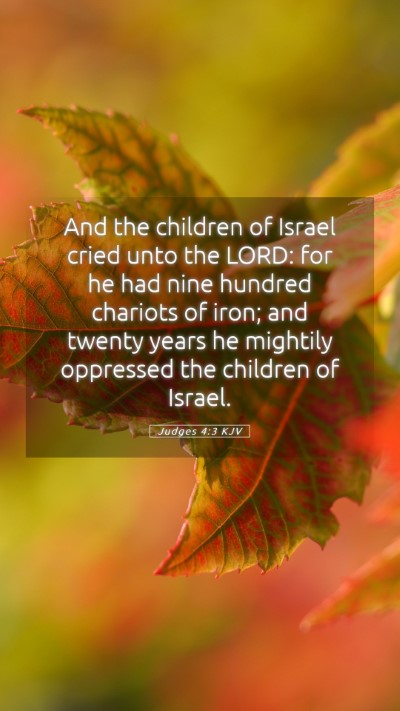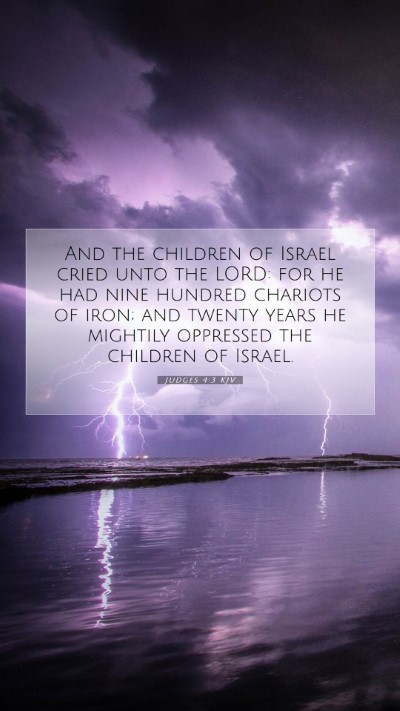Old Testament
Genesis Exodus Leviticus Numbers Deuteronomy Joshua Judges Ruth 1 Samuel 2 Samuel 1 Kings 2 Kings 1 Chronicles 2 Chronicles Ezra Nehemiah Esther Job Psalms Proverbs Ecclesiastes Song of Solomon Isaiah Jeremiah Lamentations Ezekiel Daniel Hosea Joel Amos Obadiah Jonah Micah Nahum Habakkuk Zephaniah Haggai Zechariah MalachiJudges 4:3 Meaning
What is the meaning of Judges 4:3?
And the children of Israel cried unto the LORD: for he had nine hundred chariots of iron; and twenty years he mightily oppressed the children of Israel.
Judges 4:3 Bible Verse Meaning
Understanding Judges 4:3 - A Comprehensive Bible Verse Commentary
Judges 4:3 presents a significant moment in the biblical narrative, shedding light on the themes of leadership, oppression, and divine intervention. In this analysis, we will draw on insights from esteemed public domain commentaries, including those by Matthew Henry, Albert Barnes, and Adam Clarke, to provide an in-depth understanding of this verse.
Verse Text: Judges 4:3
“And the children of Israel cried unto the Lord: for he had 900 chariots of iron; and twenty years he mightily oppressed the children of Israel.”
Contextual Overview
The Book of Judges details a tumultuous period in Israel's history, characterized by cycles of sin, oppression, repentance, and deliverance. This particular verse falls under the narrative of Israel's oppression by Sisera, commander of the Canaanite army, which was formidable due to its 900 iron chariots. The cry of the Israelites signifies their recognition of their plight and their turn towards God for deliverance.
Commentary Insights
The insights into Judges 4:3 provided by public domain commentaries reveal the multi-faceted meaning within the text.
- Matthew Henry:
Henry emphasizes the importance of Israel’s cry to God as a central theme. It illustrates the desperation of the Israelites under Sisera's oppression and their acknowledgment of their need for divine help. This cry represents both a physical and spiritual alignment towards God, signaling repentance and the longing for liberation.
- Albert Barnes:
Barnes highlights the significance of the 900 chariots of iron, which symbolize the military might of the Canaanite oppressors. He notes that the iron chariots represent an insurmountable obstacle for the Israelites, illustrating their helplessness without divine assistance. The 20 years of oppression reflects the prolonged suffering experienced by the people, reinforcing the gravity of turning to God.
- Adam Clarke:
Clarke provides insight into the psychological impact of oppression, examining how prolonged subjugation can lead to despair among a community. He notes that the Israelites’ cry reveals their awareness of their condition and their realization that only God could rescue them. Clarke emphasizes the themes of faith and reliance upon God for deliverance in times of dire distress.
Theological Implications
Judges 4:3 is not just a historical account; it carries profound theological implications. It illustrates the cyclical nature of sin and redemption within the biblical narrative, a theme that resonates throughout Scripture.
- Divine Intervention:
The verse sets the stage for God’s intervention in a dire situation, showcasing His willingness to deliver those who call upon Him.
- Human Agency and Divine Sovereignty:
This verse encapsulates the interplay between human suffering and God’s sovereignty, emphasizing that while oppression may reign for a season, God remains in control and hears the cries of His people.
- Repentance and Deliverance:
The act of crying unto the Lord signifies a turning away from sin and a recognition of neediness before God, which is essential for deliverance.
Applying Judges 4:3 to Daily Life
Understanding Judges 4:3 can provide invaluable lessons for believers today:
- Calling on God:
In times of distress, like the Israelites, we are encouraged to cry out to God, knowing He hears and responds to our pleas.
- Recognition of Oppression:
Just as the Israelites recognized their oppression, we are called to identify areas in our lives where we feel restricted or burdened and seek God for help.
- Endurance through Trials:
The passage reminds us that trials may last, but they are not without purpose; through our struggles, we can grow in faith and reliance on God.
Historical Context
The historical context of Judges 4:3 is essential for a deeper understanding of its implications. The oppression under Sisera is part of a broader pattern of unfaithfulness among the Israelites, leading to cycles of oppression by their enemies and subsequent deliverance through divinely appointed leaders, such as Deborah in this case.
Cross References
This verse can be cross-referenced with the following biblical passages for further study:
- Judges 5:6-11: Reflects on the conditions during Sisera's oppression and the eventual praise of God after deliverance.
- 1 Samuel 12:9-11: Discusses how the Israelites turned away from God, leading to their oppression.
- Psalm 34:17: Reinforces the idea that the Lord delivers the righteous from their troubles.
Conclusion
Judges 4:3 encapsulates the profound themes of oppression, repentance, and divine deliverance. Through this analysis, we comprehend the importance of crying out to God in our struggles and recognizing His readiness to respond to our needs. The insights from public domain commentaries enrich our understanding, guiding us in our personal study of Scripture and fostering deeper faith.
As you engage with this verse, consider utilizing Bible study tools and resources to explore more about its meanings and applications. Group discussions in Bible study groups or online Bible study can further enhance your understanding and provide diverse perspectives on this powerful scripture.


